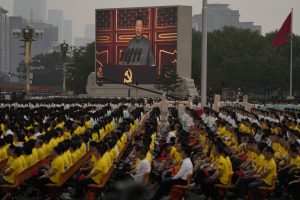On July 1, 2021, China celebrated the 100th anniversary of the founding of the Chinese Communist Party (CCP). The fete was as grand as one might imagine, featuring a mass rally, complete with a military flyover and plenty of flag-waving and patriotic songs. From an analytical perspective, the capstone was the lengthy speech given by Xi Jinping from the top of Tiananmen Gate – the same gate when Mao Zedong declared the founding of the People’s Republic of China on October 1, 1949.
Xi’s speech was heavy on emphasizing the CCP’s role in restoring China’s greatness after a century of oppression by foreign powers. “To realize national rejuvenation, the Party united and led the Chinese people in fighting bloody battles with unyielding determination, achieving great success in the new-democratic revolution,” he declared. Xi’s catchphrase of “national rejuvenation” is thus grafted onto the bones of the CCP’s earliest history.
Xi’s speech nodded to the other movements in modern China that sought the same goal, but emphasized that the CCP was the only one to pull it off, cementing the party’s long-held line that it is the sole champion capable of leading China to modernity. “China’s success hinges on the Party… without the Communist Party of China, there would be no new China and no national rejuvenation,” Xi proclaimed.
In Xi’s telling, the CCP is constantly at war both with outdated forces within China – feudalism and “bureaucrat-capitalism” – but also, importantly, with foreigners, in the form of imperialism. The CCP’s ultimate victory in China’s civil war not only unified China once again, but “put an end … to all the unequal treaties imposed on our country by foreign powers and all the privileges that imperialist powers enjoyed in China.” He has a stern warning for today’s powers as well: “The Chinese people will absolutely not allow any foreign force to bully, oppress or enslave us and anyone who attempts to do so will face broken heads and bloodshed in front of the iron Great Wall of the 1.4 billion Chinese people.”
In outlining China’s transition from “semi-colonial, semi-feudal society” to the world’s second-largest economy, Xi made the bold claim that the hundred-year history of the CCP reflects that “most magnificent chapter in the millennia-long history of the Chinese nation.”
Unsurprisingly, Xi largely skips over major part of CCP history: He jumps from the CCP’s founding and eventual victory in the civil war nearly directly to China’s transformation to a “socialist market economy” that is “open to the outside world.” In other words, Xi skips from 1949 to the post-Mao period – conveniently leaving out the turmoil of Mao’s rule, including the Great Leap Forward and Cultural Revolution. As Bonnie Girard pointed out in her analysis earlier, the CCP’s self-congratulations for developing China’s economy conveniently leave out that China was recovering from a long period of stunted growth under the CCP’s own rule.
The question, though, is how much this omission matters – particularly for young Chinese who did not directly experience the trauma of Maoist China and have only memories of increasing prosperity. There are plenty of Chinese who are trying to keep alive an alternative to the CCP’s sanitized historical narrative. But it’s important to keep in mind that there are many others who simply aren’t interested in revisiting the CCP’s many flaws.
As Robert Daly put it in a reflection for Politico:
It’s not clear that Chinese people under the age of 40 know about this bloody history or think it matters. They focus on their own prospects, which are far better than their parents’ and inestimably brighter than the violence and privation that their grandparents endured. Most young Chinese people seem to view the CCP as inevitable, irreplaceable, and as deserving of gratitude for bringing China from medieval poverty to global economic and technological prominence in the course of a single lifetime.
Across the world, peoples of various countries are more than willing to overlook the dark parts of their nations’ pasts – just look at the angry backlash in the United States against attempts to reframe history education to focus more on slavery and the legacy of anti-Black racism. Many Chinese people are just as willing to sweep unpleasant historical truths under the rug, preferring to embrace a natural pride in their country and heritage.
That doesn’t mean that the average Chinese person has no complaints about CCP rule – far from it. Issues of corruption, transparency, and the government’s role in everyday life – including a robust debate on the level of surveillance and data privacy – are often raised. But there’s a big difference between that and the perception that most Chinese are just waiting for a chance to overthrow their government.
Yes, the CCP’s history has been carefully massaged and sanitized to weed out any inconvenient truths. Yes, there is much to question in Xi’s speech and its roaring proclamations of the party’s greatness. But many people in China are genuinely celebrating the CCP’s big day all the same. The party may have a deeply checkered history, but its past 40 years have been modern China’s most successful – and the most recent years are the ones that matter most for the average person.
To paraphrase a famous U.S. presidential campaign ad, the question the CCP is posing to Chinese people is this: Are you better off than your ancestors were 100 years ago, before the party? Until the answer to that question is “no” in the eyes of most Chinese, the CCP will continue to celebrate.

































